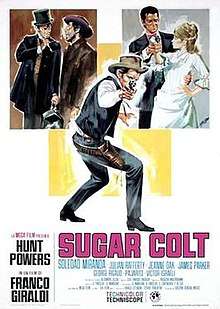Sugar Colt
Sugar Colt is a 1966 Italian and Spanish spaghetti western directed by Franco Giraldi,[1][2][3][4][5] produced by Franco Cittadini and Stenio Fiorentini, written by Sandro Continenza, Augusto Finocchi, Giuseppe Mangione and Fernando Di Leo,[6] composed by Luis Enríquez Bacalov,[7][8] filmed by Alejandro Ulloa[9] and starred by Jack Betts, Joaquín Parra,[10] Soledad Miranda, Georges Rigaud,[11] Antonio Padilla, Giuliano Raffaelli[12] and Hunt Powers.[13][14][15][16] It is the Giraldi's second film after Seven Guns for the MacGregors. The film represents the cinematographical debut for Jack Betts, here credited as Hunt Powers, and it is also Erno Crisa's last film.[17]
| Sugar Colt | |
|---|---|
 | |
| Directed by | Franco Giraldi |
| Produced by |
|
| Screenplay by |
|
| Story by |
|
| Starring | |
| Music by | |
| Cinematography | Alejandro Ulloa |
| Edited by | Ruggero Mastroianni |
Release date |
|
Running time | 106 min |
| Country | Italy Spain |
| Language | English |
Plot
Rocco – also called the man with two faces – is visited by Pinkerton, who wants him to investigate the disappearance, and possible kidnapping, of some soldiers. Rocco declines, as he has a good life teaching women self-defence. When Pinkerton is assassinated, Rocco changes his mind and goes to Snake Valley disguised as a doctor. He uses narcotic gas to loosen the tongues, and gets help from a sidekick and two women at the saloon. He is disclosed and heavily beaten, but eventually frees the hostages, while the responsible big boss gets killed.
Cast
- Hunt Powers as Dr. Tom Cooper, a famous crack shot government special agent known as Sugar Colt.[16]
- Soledad Miranda as Josefa
- Jenny Oak as Bess
- James Parker as Yonker
- José Canalejas as Bearded Bandit
- Víctor Israel as Gravedigger[3]
- George Rigaud as Allan Pinkerton
- Julian Rafferty as Col. Haberbrook
- Valentino Macchi
- Manuel Muñiz as Agonia
- Paolo Magalotti as Black
- Nazareno Zamperla as a soldier
- Giovanni Scarciofolo as Red
- Luis Barboo as Bingo
- Rossella Bergamonti
- Francisco Braña as a bandit
- Ricardo Canalejas as the bearded bandit
- Patrizia Giammei
- Mara Krupp as the woman with cigar
- Antonio Padilla
- Alfonso Rojas as the sheriff
- Alfred Thomas
- Elisabetta Velinski
Production
Filming
It was filmed in Tabernas, in the town of El Fraile, in the lodge Los Arcos and in Almería.[1]
Music
With his modernist sheet music, Luis Bacalov created the characters of Sugar Colt, Django,[18] I quattro del pater noster, Chapaqua, Lo chiamavano King and The Man Called Noon.[19]
Reception
Sugar Colt was generally well received by critics, and Tullio Kezich defined it as a "little masterpiece".[17] Over 40 years after it was made, Sugar Colt was screened at the 2007 Venice Film Festival in a spaghetti western retrospective. Director Franco Giraldi and star Jack Betts were in attendance.
In his investigation of narrative structures in Spaghetti Western films, Fridlund ranges Sugar Colt among Spaghetti Westerns heavily influenced by secret-agent films, because the hero is shown in company with beautiful women, works to uncover a mystery and - unlike the protagonists in A Fistful of Dollars and Django - does not have any complicating secondary motive.[20]
References
- Núñez Marqués 2006, p. 152, "Fuentes nominales americanas".
- Checa Godoy, Antonio (2005). "Almería y el Spaghetti-western". Las coproducciones hispano-italianas: una panorámica (pan, amor y cine) (in Spanish). Editorial Padilla Libros. p. 47. ISBN 9788484343363.
- Weisser 2005, p. 391, "Introduction".
- Fridlund 2006, p. 274, Films Quoted.
- Caparrós Lera, José María (2005). "2002". La Pantalla Popular (in Spanish). Ediciones Akal. p. 197. ISBN 9788446024149.
- Weisser 2005, p. 445, "Scriptwriters".
- Núñez Marqués 2006, p. 441, "Los músicos (1962-2002)".
- Weisser 2005, p. 434, "Music Composers".
- Weisser 2005, p. 461, "Cinematographers".
- Weisser 2005, p. 405, "Introduction".
- Weisser 2005, p. 410, "Introduction".
- Weisser 2005, p. 408, "Introduction".
- "Sugar Colt". ABC (in Spanish). Retrieved 20 November 2017.
- "Sugar colt". Movistar+ (in Spanish). Retrieved 20 November 2017.
- Núñez Marqués 2006, p. 399, "Un breve antecedente (1936-1961)".
- Weisser 2005, p. 304, "Introduction".
- Giusti, Marco (2007). Dizionario del western all'italiana (in Italian). Oscar Mondadori. p. 546. ISBN 88-04-57277-9.
- Núñez Marqués 2006, p. 416, "Estertor del pistolero (1976-2006)".
- Núñez Marqués 2006, p. 417, "Estertor del pistolero (1976-2006)".
- Fridlund, Bert (1 January 2006). The Spaghetti Western. A Thematic Analysis. Jefferson, NC and London: McFarland & Company Inc. p. 258. ISBN 9780786425075.
Bibliography
- Fridlund, Bert (2006). The Spaghetti Western: A Thematic Analysis. McFarland & Company. p. 304. ISBN 9780786425075.CS1 maint: ref=harv (link)
- Núñez Marqués, Anselmo (2006). Western a la europea...: un plato que se sirve frío (in Spanish). Entrelineas Editores. p. 485. ISBN 9788498024326.CS1 maint: ref=harv (link)
- Weisser, Thomas (2005). Spaghetti Westerns--the Good, the Bad and the Violent: A Comprehensive, Illustrated Filmography of 558 Eurowesterns and Their Personnel, 1961-1977. McFarland & Company. p. 498. ISBN 9780786424429.CS1 maint: ref=harv (link)
External links
- Sugar Colt on IMDb